Peace and Nonviolence
A provocative piece this morning from Akiva Eldar, chief political columnist and an editorial writer for Haaretz. He describes the weakness of the Israeli government when faced with non-violent protest:
“They say the Israel Air Force can carry out a pinpoint strike against Iran's nuclear facilities, yet the Israel Defense Forces loses its cool when confronted by a small group of bicyclists armed solely with cameras. The Shin Bet security service knows how to locate terrorists and assassinate them, but has no clue how to cope with nonviolent civil disobedience.”
After recounting all of the futile efforts at diplomacy and negotiations by the Palestinians in their suits and ties, Eldar advises:
“If Abbas was really so fed up he would replace his tie with a kaffiyeh and lead the masses in a protest march. The Oslo Accords have turned the Palestine Liberation Organization into the mechanism for maintaining the Israeli occupation. It's about time the Oslo generation of Palestinians admits the failure of the diplomatic option, hangs up its suits, weans itself from the pathetic honor it has accorded itself, and takes to the streets.”
I can hear Gandhi and Dr. King cheering.

I know plenty of reasonable, kind, law-abiding people who carry guns. One guy, a pilot, needs to be able to handle a firearm secured in the cockpit as part of his job. Others are hunters, police officers and former military. For them, the gun is not a status symbol. It isn’t a tool used to intimidate or threaten. Unless you know them well, you probably wouldn’t ever know they even carry guns.
And all of them are members of the National Rifle Association.
However, like many groups (organized religion included), these are not the spokespeople for the whole body that we tend to see. Rather, it’s the bombastic wing-nuts like Charlton Heston who can certainly grab headlines, but not necessarily always in the way the constituency would prefer to be represented.
The U.S. and European allies in the so-called “Friends of Syria” took another step down the slope toward military intervention this week. In a Paris conference, the talk was tough, especially from Secretary of State Hillary Clinton.
The Washington Post began its story, “The United States, France and 13 other nations demanded Thursday that Syria immediately cease military operations against rebel forces and allow unfettered deployment of U.N. observers, suggesting that use of force will be considered if Damascus fails to comply.”
It continued by quoting Sec. Clinton making the suggestion more concrete: “I think we have to do more to take stronger action against the Assad regime,” she said. “We need to start moving very urgently in the Security Council for a Chapter 7 sanctions resolution, including travel, financial sanctions, an arms embargo and the pressure that that will give us on the regime to push for compliance with Kofi Annan’s six-point plan.”
The New York Times added that “Mrs. Clinton said the United States was increasing its nonmilitary aid. Other countries may be doing more with military training. But ‘we are expanding our communications, logistics and other support for the Syrian opposition,’ she said.”
One might think that after Iraq, Afghanistan and Libya, we have learned that military intervention usually does not solve the problems it purports to, and in fact, many times exacerbates them. Yet with expanded drone strikes in Yemen, the continuing threat of attacks on Iran, and the growing war talk on Syria, we seem to have learned nothing. Stay tuned for the next war.
Duane Shank is Senior Policy Advisor at Sojourners. You can follow him on Twitter @DShankDC.
It seems that drones have become the administration’s favorite form of warfare. There’s no danger to American troops, just unmanned aircraft killing from the skies. They’ve been used in Iraq, Afghanistan, Pakistan, Somalia, Libya, and Yemen.
The campaign in Yemen has so far relied on targeting specific individuals in an attempt to distinguish between al Qaeda leaders and Yemeni insurgents. But the CIA is now seeking to expand the campaign by asking for authority to launch strikes without knowing the identities of those being attacked. They call it “signature strikes,” choosing targets based on suspicious behavior. This, the CIA claims, involved putting together multiple intelligence reports to arrive at “signatures” of al-Qaeda activity based on vehicles, facilities, communications equipment and patterns of behavior.
Assassinating specific individuals (and often their wives, children and other people who happen to be with them) is bad enough. Attacks based on “signatures” of suspicious behavior is worse. Is a group of people gathering in a house an al Qaeda meeting, or a wedding? Is a truck convoy carrying weapons, or goods to market? It seems to me that if approved, it’s a policy change that will result in more civilian casualties and more questions about the use of drones.
Duane Shank is Senior Policy Advisor at Sojourners. You can follow him on Twitter @DShankDC.
Today is the anniversary of the Warsaw Ghetto uprising in 1943, and the day designated as Holocaust Remembrance Day. Ari Shavit, senior correspondent and editorial board member of Haaretz newspaper has some important reflections on how that remembrance is used and misused.
We are being torn between those who mention Auschwitz so that Israel will be deemed innocent in every situation, and those who distance themselves from Auschwitz so that Israel will always be guilty. As a nation, we have lost the ability to experience the Holocaust both as a universal event with humanitarian significance and as a unique event with Jewish and Israeli significance. …
It is our duty not to speak harshly and not to exploit it. The Holocaust was a terrifying event of insanity. The true imperative to be derived from the Holocaust is the imperative of sanity. Not to be enslaved to the past but also not to be alienated from it. To observe death, and to remember death - and to choose life.
In a world that seems dominated by death – from Afghanistan, Iraq and Syria; to South Sudan and the Congo; this day should allow us to reflect on the 6 million Jews who died in Europe and to redouble our efforts to work for life for the millions dying or threatened with death today.
Duane Shank is Senior Policy Advisor at Sojourners. You can follow him on Twitter @DShankDC.
Each year, the Stockholm International Peace Research Institute (SIPRI) publishes a study on the amount world governments spend on their militaries. The 2011 report was released this week, showing that all countries together spent $1.7 trillion. The Guardian has a helpful country-by-country data page and interactive map. The top 5 in the world last year, totaling $1.05 trillion, were:
U. S. - $711 billion
China - $143 billion
Russia - $72 billion
Britain - $63 billion
France - $62 billion
In contrast, the budget for UN Peacekeeping operations for fiscal year July 2011-30 June 2012 is about $7.84 billion. That’s 0.5 percent of what the world spends on its militaries.
It’s a stark example of the world’s misguided priorities.
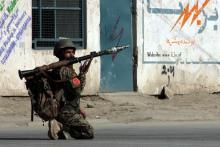
On November 21, 1967, General William Westmoreland, U.S. commander in Vietnam, delivered a speech at the National Press Club on war strategy. “We have reached an important point when the end begins to come into view,” he said, and outlined a “new phase” in the war where the U.S. would:
- Help the Vietnamese Armed Forces to continue improving their effectiveness.
- Help the new Vietnamese government to respond to popular aspirations and to reduce and eliminate corruption.
- Help the Vietnamese strengthen their policy forces to enhance law and order.
Then came what is now known as the Tet Offensive. On January 30, 1968, the National Liberation Front launched attacks against cities and towns throughout South Vietnam. It was the beginning of the end, the evidence that U.S. strategy had failed.
Fast forward 45 years. U.S. strategy in Afghanistan emphasizes assisting the Afghan army and police forces to improve their effectiveness along with working to reduce corruption in the government. We hear encouraging speeches from politicians and generals. We’re told the end is in sight.

I wouldn’t normally think to write a blog about bullying, but this time it’s personal.
Last week a beautiful mixed-race Asian-Latino boy named Teddy Molina committed suicide in Corpus Christi, Texas because of bullying. I take it really personal because I am also Asian-Latino, and I experienced mixed-raced racial taunts as a child. I especially take it personal because my son and daughter are mixed race and I must make sure that this never happens to them.
Teddy was a freshman in high school and he had experienced intense racial bullying since junior high. His parents lodged more than a dozen complaints to his high school—all to no avail. The “wolf pack”—a group formed by a handful of athletes—continued to bully Teddy. It got so bad that he was pulled out of school in March.
This bullying caused Teddy’s suicide.
From the fall of the Berlin Wall in November 1989 to the dissolution of the Soviet Union in December 1991, the Cold War ended. But U.S. policymakers apparently still haven’t gotten the news.
This meeting of the Summit of the Americas in Cartagena, Colombia, last weekend ended without the usual official declaration because U.S. policy refuses to include Cuba, while a broad range of other governments in the Americas supports an invitation. The final vote was 32-2 for Cuba’s inclusion in future meetings, with only the U.S. and Canada opposed.
Reuters noted: “U.S. insistence that Havana undertake democratic reforms before returning to the hemispheric family led to a clash with a united front of leftist and conservative governments that see Washington's policy toward Cuba as a relic of the Cold War.”
It’s long past time for the U.S. to realize that the Cold War is over, that Cuba exists, and that inclusion will foster change faster than exclusion. Even the Vatican realizes that, as Pope Benedict’s recent trip to Cuba demonstrated.

CENTREVILLE, Va. -- It's been five years since Celeste Peterson's only daughter was killed in a shooting rampage at Virginia Tech and she's finally made peace with God.
Which is not to say it's been easy.
The five-year anniversary of the nation's most deadly shooting spree -- which claimed the lives of 18-year-old Erin Peterson and 31 other victims on April 16, 2007 -- is still too fresh.
"Whether we're talking year one or year five, it still feels like yesterday," said Celeste Peterson, noting that it's been five years "since I heard her voice or held her hand."

CHARLOTTE, N.C. -- Another voice from the past is telling the stories of the Holocaust.
Violins that outlived the owners who played them in the death camps and Jewish ghettos are being brought back to life by Amnon Weinstein in his shop in Tel Aviv. As Yom Hashoah (Holocaust Remembrance) gatherings occur around the world in April, 18 violins tracked down and repaired by Weinstein will be unveiled in Charlotte, N.C.
A dozen public concerts, worship services and other programs throughout the month are expected to attract thousands who are drawn to the music, and the history behind each instrument -- the first time the violins will be shared with the public in North and South America.
Weinstein hopes he can bring the violins to other communities, in a bid to recall the 6 million Jews and 5 million others who perished at Hitler's hand.
George Masters, combat veteran and freelance writer, writes of driving behind a car with two 'Support Our Troops' ribbons. In his head, he responds:
I’m driving angry. I want to tell the guy in front of me: You want to support the troops? Get them the hell out of the line of fire. Or, if you think this war is so necessary, get over there yourself. If you’re too old, pull your kids or grandkids out of college and send them.
I’m driving sad. You want to support our troops? Give the man some space when he gets home. Give the woman a jo
After a vivid and harrowing description of his 1968 combat tour in Vietnam, he ends:
You want to do something for our troops? Bring them home.
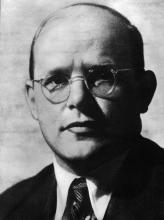
Today marks the 67th anniversary of the execution of Dietrich Bonhoeffer, the German pastor and theologian who was a member of the German resistance movement against Nazism in the 1930s and 1940s and a founding member of the Confessing Church in Germany, which represented a major source of Christian opposition to the Nazi government in Germany.
An outspoken critic of Adolf Hitler and the Nazi party, Bonhoeffer was arrested in 1943 and hanged at Flossenbürg concentration camp 9 April, 1945 – just a month before Germany surrendered and the War in Europe ended.
One of the most influential Christian thinkers and writers of the 20th Century, Sojourners today honors the memory of Dietrich Bonhoeffer.
“The ultimate test of a moral society is the kind of world that it leaves to its children.” – Dietrich Bonhoeffer.
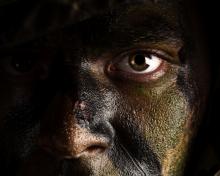
One year after Syrian President Bashar al-Assad’s April 2011 crack down on civilian protests against his regime’s torture of students who had put up anti-government graffiti, the U.S. and the world are still figuring out what to do about it.
On March 21 the United Nations Security Council announced that it backed a six-point peace plan put forward by former UN General Secretary Kofi Annan. By March 27, Annan reported that al-Assad had accepted the cease-fire plan that will take effect April 10. But even as al-Assad met with Annan, reports of escalated crackdowns surfaced. Then on April 3 reports of military escalation in four major urban centers dashed hopes that al-Assad’s April 10 military withdrawal will actually take place.
And so the world waits for Tuesday. Then we will know what legitimate courses of action may come next. If al-Assad abides by the peace plan, then the world can exhale and allow peace to have its process. If not, then multiple questions step to the fore.
As if conventionally powered drones weren’t bad enough, a report has it that scientists are developing nuclear-powered drones that could stay in the air for months without refueling. In addition to the fact that this would make drones more efficient killing machines, it also increases the dangers from crashes. Drones are especially prone to crashing, and with a nuclear reactor, a crash would be “in effect turning the drone into a so-called dirty bomb.
The project has apparently been put on hold, with a research summary concluding that "none of the results will be used in the near-term or mid-term future," due to political constraints. But with the increasing reliance on drones by the military, I suspect it won’t be long before it’s resumed.
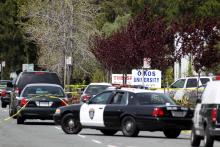
Seven people died and three others were injured Monday afternoon when a gunman opened fire on the Oakland, Calif., campus of Oikos University — a small Christian college that caters largely to a Korean and Korean-American student body.
According to CNN, police have detained a man in his 40s who police believe to be the shooter. Oikos University founder and president, the Rev. Jong Kim, told the Oakland Tribune that the gunman was a nursing student who was no longer enrolled at the school.
An update of the Oakland Tribune story shortly after 9 p.m. EST Monday police have arrested 43-year-old One Goh of Oakland in connection with the deadly shooting.
A former nursing student who opened fire in a small Christian university Monday morning, killing seven and wounding three more, first told his former classmates to line up against a wall before pulling a handgun and sending students fleeing in panic, a witness said....
Police said five people were dead at the scene; of five others who were taken to the hospital, two later died. Authorities said most of those killed and wounded had been in a classroom near the school's entrance; one was shot in an administrative office. The gunman reportedly went to another classroom and fired through its locked door but didn't hit anyone there.
The gunman was caught a short time later in an Alameda shopping center, about five miles away, police said. Safeway employees who did not give their names said the suspect told a store staffer that he had shot people and needed to be arrested.
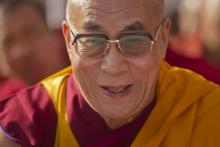
The Dalai Lama is best known for his commitment to Tibetan autonomy from China and his message of spirituality, nonviolence and peace that has made him a best-selling author and a speaker who can pack entire arenas.
But somewhat under the radar screen, the Tibetan Buddhist leader and Nobel Prize laureate has also had an abiding interest in the intersection of science and religion.
That interest won Tenzin Gyatso, the 14th Dalai Lama, the 2012 Templeton Prize on Thursday (March 29), a $1.7 million award that is often described as the most prestigious award in religion.

The men burst into the church classroom and ordered the 15 teens in the youth group to the floor.
They covered the teens' heads with pillowcases and bound their hands. One man waved an unloaded gun, and another yelled, his face daubed with camouflage paint.
The kids gathered at the Glad Tidings Assembly of God Church and had planned to partake in youth ministry activities at 7 p.m. Wednesday (March 21).
Instead, they found themselves face down, hugging the linoleum floor, said the Rev. John Lanza, who described what happened. If they listened, they wouldn't get hurt, their assailants said.